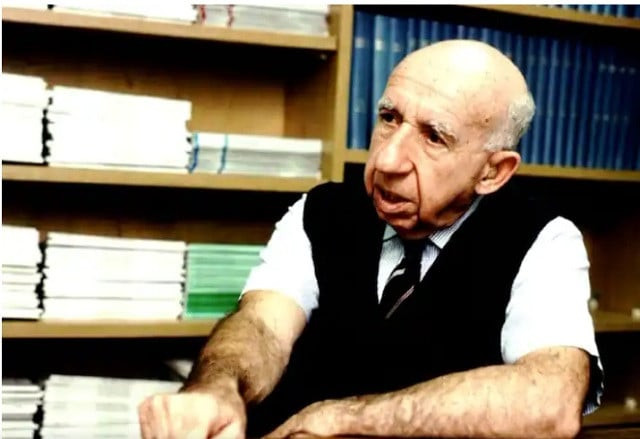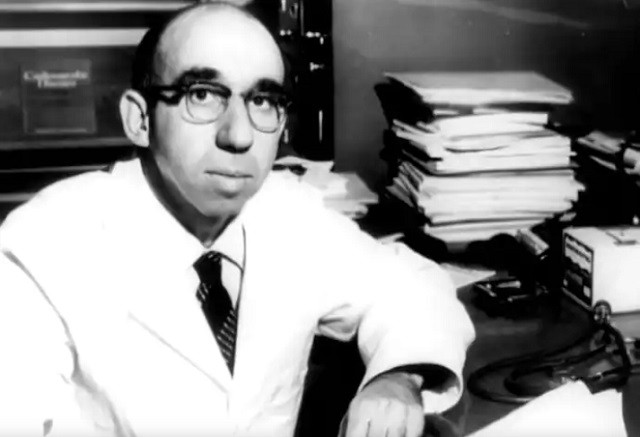US researcher, who linked lifestyle with heart health, dies aged 102
Jeremiah Stamler, called the father of preventive cardiology, was known for his breakthrough researches

Jeremiah Stamler, a relentless cardiovascular researcher who helped exhibit that diet and lifestyle play a key role in heart health, creating a stir in the medical establishment after years, died at the age of 102.
The tireless health expert put forth his ideas at a time when cardiac arrest was seen as an inevitable outcome of ageing and genes, The Washington Post reported.
Stamler was striving to get grants for his research team even a week before his death, demonstrating how dedicated he was to his work.
A professor at the Northwestern University Feinberg School of Medicine, he was part of the research group that identified risk factors pertaining to heart disease, such as cholesterol, blood pressure, diabetes and smoking, now seen as the major causes for heart attacks

A young Dr Stamler. Photo courtesy: Northwestern University
“It really transformed medicine, from a reactive stance to a proactive stance, so that we could extend and improve people’s lives,” said President of the American Heart Association Donald M Lloyd-Jones,
On another occasion, Jones said that the research by Dr Stamler had “put new tools in the toolbox,” saying, “He showed us that while genes can load the gun, it’s really lifestyle that pulls the trigger.”
The heart expert focused majorly on diet and blood pressure studies, and was opposed sometimes by the food industry groups.
He was best identified for his research in medical science, published in at least 22 books and over 670 papers.
Also read: ‘Lifestyle changes lead heart ailments among youth in India’
The learned professor was also credited with the development of innovative ways to treat hypertension and blood pressure.
Dr Stamler was called the father of preventive cardiology, which described his approach to treating the disease at the grassroots.
In terms of the notion that cholesterol, high blood pressure or body fat levels were a result of ageing, the professor said, “We’re accommodated to a nomadic way of life that had a little salt, little fat, lots of exercises, little or no obesity.
“Most of us are not genetically adapted to current lifestyles. So our cholesterol, blood pressure, blood glucose and uric acid levels go up.”
As a result of his studies in part, experts were able to redetermine a normal blood pressure, with 120/80 later cited as the key benchmark for most adults.
Also read: Move, sleep, repeat: 5 ways to keep your heart pumping seamlessly
Dr Stamler's study entitled 'Intersalt' that came to the fore in 1997 included over 10,000 test subjects, and it successfully reaffirmed a link between high salt intake and blood pressure.
This caused a change in the guidelines published by groups including the American Heart Association.
“His mantra was 'firm, steady pressure'," Jones said. “If you can bring the best science to bear and answer the questions, over time the firm, steady pressure of excellent science and clear data will win the day. That’s really how he did his work. It wasn’t flashy one-off things. It was, let’s build the case and do it one study at a time.”
According to one of the researcher's colleagues, “He had the ability to energise other people to want to work with him. There are these lone-ranger types in science who just go in their lab and work away at a project for their whole life. Nobody knows who they are. By contrast, Dr Stamler travelled all over the world meeting with people."
But a more interesting account was in the words of Dr Stamler's stepson, "When he was about 98, he said to me, I don’t know how much longer I can go on, maybe this is it. And the next time I saw him, he goes, ‘I got a grant renewal! I’m living to 102!’”



















COMMENTS
Comments are moderated and generally will be posted if they are on-topic and not abusive.
For more information, please see our Comments FAQ